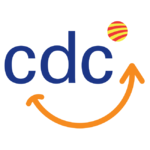
Back حزب التقارب الديمقراطي في كتالونيا Arabic تقارب كاتالونيا الديموقراطى ARZ Converxencia Democrática de Cataluña AST Convergència Democràtica de Catalunya Catalan Convergència Democràtica de Catalunya Welsh Convergència Democràtica de Catalunya German Δημοκρατική Σύγκλιση της Καταλονίας Greek Convergència Democràtica de Catalunya Esperanto Convergencia Democrática de Cataluña Spanish Kataluniako Konbergentzia Demokratikoa Basque
Democratic Convergence of Catalonia Convergència Democràtica de Catalunya | |
|---|---|
 | |
| Abbreviation | CDC |
| Founder | Jordi Pujol |
| Founded | 17 November 1974 |
| Registered | 23 February 1977 |
| Dissolved | 10 July 2016 (refoundation)[a] |
| Succeeded by | Catalan European Democratic Party |
| Headquarters | Historical: C/ Còrsega, 331-333 08037, Barcelona Current: C/ Consell de Cent, 113-115, bjs. 08015, Barcelona |
| Youth wing | Nationalist Youth of Catalonia (1980–2016) |
| Ideology | Catalan independence[b] Catalan nationalism[2][3] Liberalism[2] Conservative liberalism[4] Social democracy (minority)[5][6][7] |
| Political position | Centre-right |
| National affiliation | Democratic Pact for Catalonia (1977–78) Democracy and Catalonia (1977–78) Convergence and Union (1978–2015) Catalonia in the Senate (1982–83) Junts pel Sí (2015–16) Democracy and Freedom (2015–16) Together for Catalonia (2017–19)[c] |
| European affiliation | Alliance of Liberals and Democrats for Europe |
| European Parliament group | Alliance of Liberals and Democrats for Europe |
| Colors | Blue Orange |
| Website | |
| www.convergencia.cat | |
The Democratic Convergence of Catalonia (Catalan: Convergència Democràtica de Catalunya; IPA: [kumbəɾˈʒɛnsi.ə ðəmuˈkɾatikə ðə kətəˈluɲə], CDC), frequently shortened as Convergence (Catalan: Convergència; Catalan pronunciation: [kumbəɾˈʒɛnsi.ə]) was a Catalan nationalist, liberal political party in Catalonia (Spain),[2][3] currently still existing without any political activity.[c]
The party was originally created around the figure of Jordi Pujol in 1974, but it was not legally registered until February 1977.[11] Between 1978 and 2015, the party was a member of the Convergence and Union (CiU) alliance that dominated Catalan politics for almost the entirety of its existence; first as an electoral alliance with the christian democratic Democratic Union of Catalonia (UDC), then as a party federation on 2 December 2001.[12] For 37 years, both parties contested all elections under the CiU umbrella, being the first political group in the Parliament of Catalonia for its entire history and forming the regional government for nearly three decades (1980–2003 and 2010–2015). In June 2015, the CiU federation split over the issue of Catalan independence.
On 8–10 July 2016, the party was refounded into the Catalan European Democratic Party (PDeCAT),[13][14] with CDC's political activity being passed to the new party, though CDC has remained active as a way to preserve its public funding and electoral rights in favour of the PDeCAT and the Together for Catalonia alliance.[9] At the time of the party's refoundation in July 2016, it had 15,019 members.[15]
- ^ García Pagán, Isabel; Gisbert, Josep (11 July 2016). "Las nueve claves del Partir Demòcrata y su independentismo sin matices". La Vanguardia (in Spanish). Barcelona. Retrieved 15 July 2020.
- ^ a b c Dowling, Andrew (2005), "Convergència i Unió, Catalonia and the new Catalanism", The Politics of Contemporary Spain, Rotledge, p. 106
- ^ a b Ramiro, Luis; Morales, Laura (2007), "European integration and Spanish parties: Elite empowerment amidst limited adaptation", The Europeanization of National Political Parties: Power and organizational adaptation, Routledge, p. 145
- ^ Slomp, Hans (2011). Europe, a Political Profile: An American Companion to European Politics. ABC-CLIO. p. 518. ISBN 978-0-313-39181-1.
- ^ Sallés, Quico (7 March 2015). "El sector liberal planta batalla a la socialdemocràcia de la nova CDC". Nació Digital (in Catalan). Barcelona. Retrieved 18 July 2020.
- ^ Lamelas, Marcos (22 June 2015). "Mas vira hacia la socialdemocracia a las puertas del 27-S con su nuevo Gobierno". El Confidencial (in Spanish). Barcelona. Retrieved 18 July 2020.
- ^ "Perfil: Puigdemont, el ala más independentista de CDC". Diario de Sevilla (in Spanish). Barcelona. EFE. 9 January 2016. Retrieved 18 July 2020.
- ^ "C3. Coalición electoral "Junts per Catalunya"". www.juntaelectoralcentral.es (in Spanish). Central Electoral Commission. Retrieved 9 July 2020.
- ^ a b Lamelas, Marcos (24 November 2017). "El PDeCAT va el 21-D en coalición consigo mismo para cobrar las subvenciones de CDC". El Confidencial (in Spanish). Barcelona. Retrieved 15 July 2020.
- ^ "El PDeCAT se quedará todas las subvenciones electorales que obtenga la coalición Junts" (in Spanish). Madrid: Europa Press. 3 October 2019. Retrieved 9 July 2020.
- ^ "Registro de Partidos Políticos". sede.mir.gob.es (in Spanish). Ministry of the Interior. Retrieved 15 July 2020.
- ^ Quadrado, Susana (3 December 2001). "CDC y Unió firman la federación que sella la paz para ganar las próximas elecciones". La Vanguardia (in Spanish). Barcelona. Retrieved 14 July 2020.
- ^ Casals, David (8 July 2016). "Fuerte malestar contra Artur Mas en el congreso de la nueva CDC". Expansión (in Spanish). Barcelona. Retrieved 15 July 2020.
- ^ García Sastre, Daniel (10 July 2016). "Convergència ya se llama Partit Demòcrata Català". El Mundo (in Spanish). Barcelona. Retrieved 15 July 2020.
- ^ Masreal, Fidel (20 May 2016). "Las bases de CDC deciden este sábado entre haraquiri o refundación" (in Spanish). El Periódico de Catalunya. Retrieved 17 July 2020.
Cite error: There are <ref group=lower-alpha> tags or {{efn}} templates on this page, but the references will not show without a {{reflist|group=lower-alpha}} template or {{notelist}} template (see the help page).